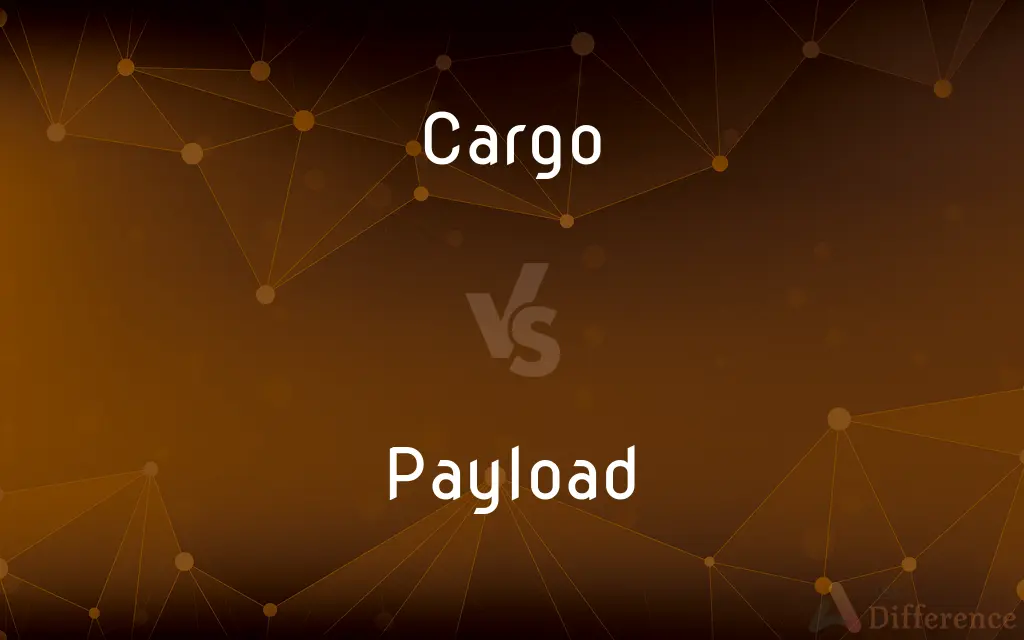Cargo vs. Payload — What's the Difference?
By Tayyaba Rehman & Urooj Arif — Updated on March 14, 2024
Cargo refers to goods or products transported by any means, such as ships, planes, or trucks. Payload, while similar, specifically denotes the carrying capacity of a vehicle or craft, often emphasizing valuable or mission-critical items.

Difference Between Cargo and Payload
Table of Contents
ADVERTISEMENT
Key Differences
Cargo is a broad term that encompasses any items being transported for commercial purposes, covering a wide range of goods from raw materials to finished products. Payload, on the other hand, is a term often used in specific contexts such as aviation, spaceflight, or telecommunications, highlighting the portion of a vehicle's carrying capacity that is utilized for valuable or mission-critical materials, excluding the vehicle's own weight and fuel.
While cargo can refer to virtually any type of goods transported by various modes of transport, payload specifically refers to the effective load that contributes directly to the purpose of the mission, such as satellites for a launch vehicle, or goods paying for transport in commercial vehicles. This distinction is crucial in fields like aerospace, where payload capacity directly influences mission design and vehicle performance.
The concept of cargo is integral to the global supply chain, emphasizing the movement and delivery of goods across distances. Payload, however, often carries implications of efficiency and effectiveness, particularly in how much value or utility is derived from the transport capacity of the vehicle or craft.
In practical terms, all payloads can be considered cargo, but not all cargo is regarded as payload. The term "payload" is used when the emphasis is on the value or purpose of the load being transported, as opposed to the general concept of transport goods, which is signified by "cargo."
Comparison Chart
Definition
Goods transported for commercial gain.
The part of a vehicle's load from which utility is derived.
ADVERTISEMENT
Context
Broad, applies to any transport mode.
Specific, often related to aviation, space, or telecommunications.
Implication
Emphasizes the movement of goods.
Emphasizes utility, value, or mission-critical nature.
Examples
Consumer products, raw materials.
Satellites, scientific instruments, commercial goods paying for transport.
Consideration
Volume and weight limits.
Capacity utilized for valuable or essential goods, excluding the vehicle's own necessities.
Compare with Definitions
Cargo
Goods carried on a ship, aircraft, or motor vehicle.
The cargo ship was loaded with containers bound for overseas markets.
Payload
The carrying capacity of an aircraft or spacecraft, excluding fuel and provisions for the crew.
The rocket's payload included a satellite for Earth observation.
Cargo
Transported goods in commercial trade.
The train was loaded with cargo including grain and coal.
Payload
Valuable or mission-critical items transported.
The payload for the deep-sea exploration mission included advanced scientific equipment.
Cargo
The freight carried by a vehicle for commercial gain.
Airlines transport both passengers and cargo to various destinations.
Payload
The portion of a vehicle's carrying capacity utilized for specific, valuable goods.
The transport helicopter had a payload capacity optimized for rapid medical evacuation operations.
Cargo
Items transported in bulk by various transportation modes.
The trucking company specializes in hazardous cargo.
Payload
The part of a vehicle's load that generates revenue.
The airline maximizes payload by carefully managing cargo and passenger tickets.
Cargo
The act of carrying goods for trade.
The ancient trade routes were essential for the cargo of spices and silk.
Payload
The effective load carried by a vehicle that contributes to its purpose.
The drone's payload was a high-resolution camera for aerial photography.
Cargo
In economics, the word cargo refers in particular to goods or produce being conveyed—generally for commercial gain—by water, air or land. Freight is the price paid to carry cargo.
Payload
Payload is the object or the entity which is being carried by an aircraft or launch vehicle. Sometimes payload also refers to the carrying capacity of an aircraft or launch vehicle, usually measured in terms of weight.
Cargo
Freight carried by a ship, an aircraft, or another vehicle.
Payload
The revenue-producing part of a cargo.
Cargo
Freight carried by a ship, aircraft, or motor vehicle.
Payload
The total weight of passengers and cargo that an aircraft carries or can carry.
Cargo
(Papua New Guinea) Western material goods.
Payload
The total weight of the instruments, crew, and life-support systems that a spacecraft carries or can carry.
Cargo
The lading or freight of a ship or other vessel; the goods, merchandise, or whatever is conveyed in a vessel or boat; load; freight.
Cargoes of food or clothing.
Payload
The passengers, crew, instruments, or equipment carried by an aircraft, spacecraft, or rocket.
Cargo
Goods carried by a large vehicle
Payload
An explosive charge, biological or chemical agent, or other destructive element borne by a missile or bomb.
Payload
That part of a cargo that produces revenue.
Payload
The total weight of passengers, crew, equipment, and cargo carried by an aircraft or spacecraft.
Payload
That part of a rocket, missile, propelled stinger, or torpedo that is not concerned with propulsion or guidance, such as a warhead or satellite.
Payload
(computing) The functional part of a computer virus or another type of malware program, rather than the part that spreads it.
Payload
(communication) The actual data in a data stream.
Payload
The part of a missile or torpedo that carries the explosive charge.
Payload
The goods carried by a large vehicle.
Payload
The front part of a guided missile or rocket or torpedo that carries the nuclear or explosive charge or the chemical or biological agents
Payload
Goods carried by a large vehicle
Common Curiosities
Can a vehicle's payload include passengers?
Yes, in contexts like commercial aviation, passengers can be considered part of the payload as they contribute to the vehicle's revenue.
What is the difference between cargo and payload?
Cargo refers to goods transported for commercial purposes, while payload is the part of a vehicle's carrying capacity utilized for valuable or mission-critical items.
How do transportation companies calculate payload?
Transportation companies calculate payload by subtracting the vehicle's empty weight (and sometimes fuel weight) from its gross weight limit.
How is payload capacity important in aerospace?
In aerospace, payload capacity determines the effectiveness and efficiency of space missions, influencing vehicle design and mission objectives.
Does the concept of payload apply to non-commercial vehicles?
Yes, the concept of payload can apply to any vehicle, including non-commercial or military vehicles, where it denotes the carrying capacity for mission-critical equipment.
Is all cargo considered payload?
Not all cargo is considered payload; payload specifically refers to the portion of the cargo that provides utility or value in the context of the vehicle's mission.
Can the same item be both cargo and payload?
Yes, an item can be considered both cargo and payload, especially if it is goods being transported for commercial gain that also serve a specific, valuable purpose.
How do regulations affect cargo and payload?
Regulations affect cargo and payload by setting limits on weight, volume, and types of materials that can be transported, ensuring safety and efficiency.
Why is optimizing payload important?
Optimizing payload is important for maximizing efficiency, reducing costs, and ensuring the success of transportation and mission objectives.
How does the concept of payload vary between different modes of transport?
The concept of payload varies in emphasis on value and mission-critical nature, particularly prominent in aerospace and less so in routine commercial transport.
What role does cargo play in the global economy?
Cargo plays a crucial role in the global economy by enabling the movement of goods across international borders, supporting trade and commerce.
How do changes in technology affect cargo and payload capacities?
Advances in technology can increase cargo and payload capacities by improving vehicle efficiency, design, and material strength, allowing for more goods to be transported more efficiently.
Can environmental considerations impact payload decisions?
Yes, environmental considerations can impact payload decisions, especially in reducing vehicle weight to save fuel and reduce emissions.
What innovations are shaping the future of cargo and payload transport?
Innovations such as autonomous vehicles, advanced materials, and more efficient propulsion systems are shaping the future of cargo and payload transport by increasing capacity and reducing environmental impact.
How do companies balance cargo and payload efficiency?
Companies balance cargo and payload efficiency through strategic planning, vehicle design, and maximizing the use of available capacity.
Share Your Discovery

Previous Comparison
Adjustment vs. Maladjustment
Next Comparison
Cheetah vs. CatAuthor Spotlight
Written by
Tayyaba RehmanTayyaba Rehman is a distinguished writer, currently serving as a primary contributor to askdifference.com. As a researcher in semantics and etymology, Tayyaba's passion for the complexity of languages and their distinctions has found a perfect home on the platform. Tayyaba delves into the intricacies of language, distinguishing between commonly confused words and phrases, thereby providing clarity for readers worldwide.
Co-written by
Urooj ArifUrooj is a skilled content writer at Ask Difference, known for her exceptional ability to simplify complex topics into engaging and informative content. With a passion for research and a flair for clear, concise writing, she consistently delivers articles that resonate with our diverse audience.
















































